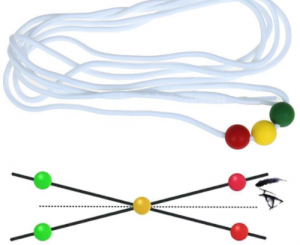Has your optometrist recommended a program of vision therapy?
Vision therapy is an effective program designed to treat a variety of vision conditions that cannot be treated with corrective eyewear alone.
The information on this page will help you to understand how vision therapy works, and what you can gain from this specialized treatment program— if you follow the do’s and don’ts listed below.
DO
1. DO your research
Although eye doctors have been providing vision therapy for over 100 years, many people are still unaware of its efficacy and all of the benefits this treatment program can offer.
In recent years, numerous research studies have been funded by the National Eye Institute (NEI) to prove the efficacy of vision therapy.
According to these studies, office-based vision therapy with home-based reinforcement is the most effective treatment for lazy eye, strabismus (eye turns) and convergence insufficiency.
Additionally, studies have shown that vision therapy is equally effective in improving attention and concentration, helping children with reading and learning difficulties, enhancing athletic performance, and even boosting self esteem.
Understanding the true facts about vision therapy by reading the research on its efficacy, is the first step to getting the help you need and deserve.
2. DO find an experienced eye doctor
It is important to find an eye doctor that has training and experience in vision therapy.
Eye doctors are trained and board certified to offer competent advice on eye care, but not all eye doctors undergo extensive training in vision therapy.
Developmental optometrists are a subset of optometrists that have undertaken extensive post-graduate training in the field of vision therapy.
Developmental optometrists are trained in evaluating children with learning difficulties, attention issues and poor hand-eye coordination— and can provide vision therapy to improve these conditions.
If you or your child is suffering from a vision condition that can be treated with vision therapy, such as lazy eye, convergence insufficiency, strabismus, or difficulties with eye tracking or visual processing, schedule a functional vision evaluation with a developmental optometrist.
3. DO have a comprehensive functional vision evaluation
If your child is struggling with their academic performance, or you find it challenging to keep up with the demands of your job, a vision problem may be the underlying cause.
Unfortunately, most eye exams and vision screenings do not assess functional vision, which includes the visual skills necessary for most of the tasks you perform on a daily basis, such as reading, writing, concentrating, and more.
Any type of functional vision problem, such as lazy eye, strabismus, convergence insufficiency, or even visual disturbances that develop following a head injury, can lead to learning difficulties at school or challenges at work.
4. DO think about the benefits of vision therapy
The benefits of vision therapy can be life-changing.
Although the cost of vision therapy may be something to consider if you are on a tight budget, it is important to keep in mind that the benefits of vision therapy will last a lifetime— and may even eliminate additional expenses incurred from tutors or other special programs you may believe will help your child to improve their skills.
It is also important to be aware that some health insurance plans include partial coverage for vision therapy. If your health insurance does not cover vision therapy, you may be able to work out a payment plan with your eye doctor to make the program more affordable.
5. DO consider vision therapy, even if you already have eyeglasses
Eyeglasses cannot correct all vision problems.
While eyeglasses and contact lenses can correct blurry vision, they cannot treat vision problems related to reduced visual skills, such as eye tracking, eye teaming and visual perceptual problems.
Vision therapy treats the underlying problem by strengthening the visual system and improving the visual skills needed for clear and comfortable vision.
To find out more about vision therapy, contact an eye doctor near you.
SEE RELATED: Guide to Vision Therapy
DON’T
1. DON’T think that ‘20/20 sight’ means your eyes are perfect
The myth that 20/20 eyesight means “perfect” vision prevents many people from getting the help they truly need.
Having 20/20 eyesight, or visual acuity, means that you can clearly see an object from a distance of 20 feet.
Visual acuity does not provide an indication of how well you can see near objects, nor does it indicate the strength of your visual skills.
If you have been told that you have 20/20 vision, but suffer from eye strain, headaches, or reading difficulties, you may have a functional vision problem.
2. DON’T think that eye surgery is the only option
Many eye doctors will recommend eye muscle surgery for the treatment of strabismus, or eye turns. However, while strabismus surgery can help the eyes to appear aligned, it cannot help to establish the necessary eye-brain connections to improve binocular vision.
Vision therapy develops and strengthens the eye-brain connections and teaches the brain how to use both of the eyes together. Therefore, vision therapy is often recommended either before or after any type of eye surgery.
3. DON’T think that all vision therapy programs are the same
Every program of vision therapy is custom designed for each individual patient and their specific visual needs.
In some cases, vision therapy may include the use of specialized tools and equipment, such as lenses, prisms or computer-based games.
In other cases, vision therapy may be prescribed in combination with corrective eyewear, prism lenses, or even surgery.
LEARN MORE: Guide to Vision Therapy
To find out if vision therapy can help you or your child, schedule a comprehensive vision evaluation with a developmental optometrist near you.
Vision therapy is an effective program designed to improve the visual skills that cannot be treated with corrective eyewear alone.
If you child has any learning or reading difficulties, vision therapy might just be the answer you have been searching for.


